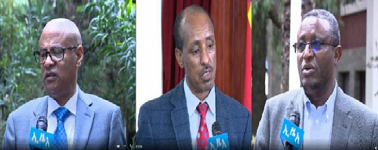Scholars have called on Egypt and Sudan to financially support the natural resources conservation works carried out in the Nile Basin.
One of the contributions that the Grand Ethiopian Renaissance Dam (GERD) makes to Sudan is minimizing the recurrent flooding and sedimentation on its hydro-power dams.
And unless countries cooperate in jointly protecting trans-boundary resources, the resources could not be utilized sustainably, the scholars pointed out.
Ethiopia has been working on natural conversation and environmental protection activities on Abay basin for the past 40 years.
Even if the downstream countries, Egypt and Sudan, are the major beneficiaries of this river, they have no role in the development and conservation of natural resources as well as protection of the environment, they further noted.
Water and Land Center Director at the Addis Ababa University, Gete Zeleke insisted that Egypt and Sudan must participate in the ongoing activities being undertaken in Ethiopia by providing financial support in order to protect these natural resources from danger of climate changes and exploit them in a sustainable manner for the benefits of the countries.
“Protecting the source of the river should not be left only to Ethiopia. Since Sudan and Egypt are the major beneficiaries of Abay River, they have the responsibility to protect the water from drying up. They have to invest on the protection and conversation activities of the water. Ethiopia has the legal right to demand the two countries compensation for the expenses it incurred for the conservations. Out of the works carried out by Ethiopia over the past 40 years for the conservation of water and soil, 73 percent accounted for the works across the Nile Basin. This indicates that Ethiopia has been investing not only for its people but also for Sudan and Egypt. Therefore, a condition wherein they contribute towards protecting the river source collectively must be created.”
Hawasa University President, Ayanaw Bedasso said on his part that “while we spending huge money and labor, they have been utilizing the resource freely. Now, they should be asked to partake in the conservation activities, including soil and water conservation as well as tree seedlings planting, in addition to financial contribution.”
Addis Ababa University President, Professor Tassew Woldehana said Egypt and Sudan must support Ethiopia in its efforts to expand forests in order to curb natural disasters that might be encountered across the basin due to deforestation.
“Ethiopia is investing in the various activities on mountains with a view to reducing sedimentation across the GERD by its own. But the downstream countries have been benefiting from this without any investment. The countries have to participate in protecting areas largely degraded to decrease sedimentation which might affect them too. Therefore, Egypt and Sudan have to be ready to support the source and benefit,” he elaborated.
Experts indicate that with invigorated sedimentation preventive measures across the basin, all the three countries could benefit more from the Nile River. ENA

